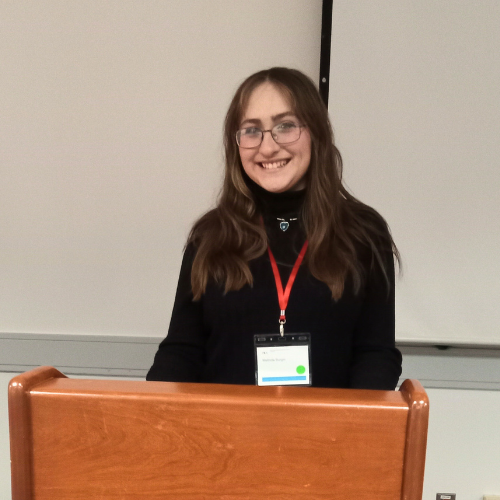BLOOMINGTON, Ill. — From a young age, Melinda Burgin ‘25 has been committed to addressing climate change. Now as a political science major at Illinois Wesleyan, she has been selected to showcase her research at prominent conferences in the field.
Burgin will participate in an undergraduate poster session at the Midwest Political Science Association Conference in Chicago on April 4-7. The Midwest Political Science Association is the second largest political science group in the country, and their annual conference is attended by the nation’s top scholars.

“My research paper, titled ‘Reframing Climate Change: A Response to Peter Singer,’ focuses on global inequality in the causes and experiences of climate change," including a data-based analysis of global climate action thus far and an evaluation of where it has fallen short ethically, said Burgin.
Moral philosopher Peter Singer has proposed that the burden of addressing climate change could be managed by assigning a “carbon budget” equally per capita.
“I argue that his proposal does not go far enough to address the historical and continuing violations of human rights, mainly perpetrated by the global north against the world’s most vulnerable, and falsely assumes that carbon is still a resource that we have the moral right to use,” said Burgin.
Her paper suggests that climate change should instead be viewed as a human rights issue and should be quickly and drastically addressed to “prioritize the needs of the most vulnerable over the desires of the powerful.”
Burgin said anyone who truly understands climate change cannot ignore its implications. Her own interest in the issue began in elementary school when she became a vegetarian and learned about endangered species and environmental impacts from the meat industry.
“I began to learn more about climate change’s disproportionate impacts on already disadvantaged groups, from environmental racism exhibited on a local scale in Chicago to global inequalities between developed and developing nations,” she said.
Burgin was then introduced to the global debate on ethical climate action while taking the course Multiculturalism and Its Critics with Ben and Susan Rhodes Endowed Professor in Peace and Social Justice and Professor of Political Science James Simeone.
“It has been exciting to work with Melinda these past two years,” said Simeone, who has mentored Burgin throughout the process. “It is rare that an undergraduate will challenge an authority as eminent as Peter Singer. However, she not only had the temerity to make the challenge, she also developed a very persuasive case.”
Burgin also presented her paper at the Pi Sigma Alpha National Student Research conference in Washington, D.C., in February. She was joined by other students showcasing findings about global impacts of climate change. The panelists received feedback from a graduate discussant, a professor and each other after each presentation.
“The feedback I received, as well as the presentations of other students, gave me a lot to think about for future work,” said Burgin. “I definitely returned more inspired than ever to continue work in this field.”
After college, Burgin plans to attend law school to pursue a career in environmental law or human rights law.
“The experiences I've had, from engaging in the actual research over the summer to now presenting my work, have opened a whole new world for me, and I am so grateful to Illinois Wesleyan for offering me the opportunity and to Professor Simeone for his guidance throughout the experience,” she said. “I think it's so amazing that Illinois Wesleyan offers these opportunities to pursue research as an undergraduate, and I really encourage other students to look into them.”